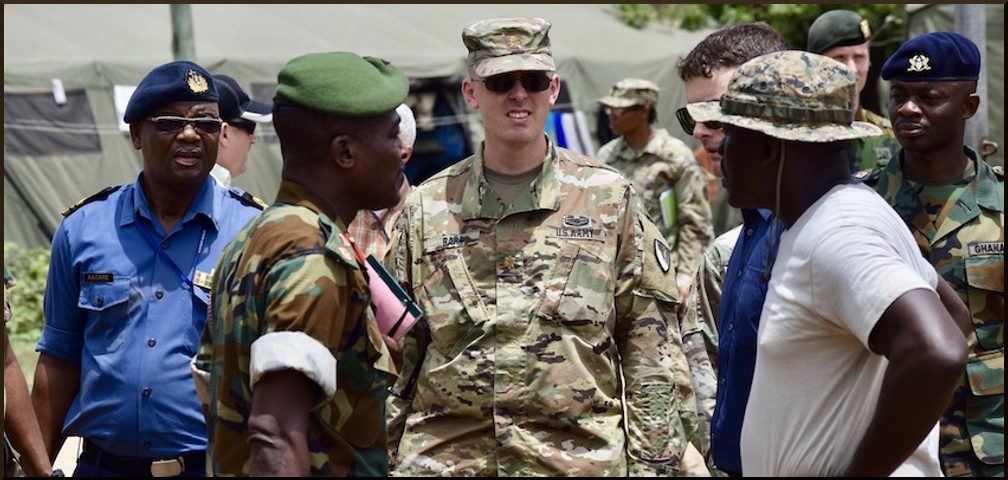by Mark P. Fancher, Published on Black Agenda Report, September 18, 2019
The U.S. has gone extra miles to support French military efforts to protect uranium mining in Niger.
“When U.S. economic or geo-political interests are in jeopardy in Africa, France is often regarded as the “go-to” country for a military solution.”
Two years ago, four U.S. soldiers deployed in Niger were ambushed and killed. The black soldier, La David Johnson, was recently awarded a posthumous Silver Star medal. However, when the news of the killings first reached U.S. shores in 2017, it set off a storm of controversy. Several senators candidly admitted they had no idea hundreds of U.S. troops were in Niger. To this day there is widespread skepticism about official explanations that the soldiers were engaged in anti-terrorist operations.
The machinery that powers imperialism has no “off” switch. This is perhaps most evident in Africa where regardless of dozens of events that should have led to the interruption if not cessation of U.S. military operations on the continent, the presence of the U.S. military expands. Niger is a case in point.
Given the public anger about the loss of soldiers’ lives, the absence of the public’s commitment to an undefined mission in Niger, and Donald Trump’s general distaste for overseas military adventures, the U.S. program in Niger should have been shelved long ago. However, last month news arrived that not only is construction of a major U.S. Air Force base underway, but also a decision to expand it has been made even before it opens. What’s going on here? The short, quick answer is that in Africa, the U.S. is France’s toady. France is committed to stealing Niger’s uranium, and the U.S. feels obligated to help.
“The machinery that powers imperialism has no ‘off’ switch.”
The environmental magazine Down to Earth reports: “Three out of four light bulbs in France are illuminated through Nigerien uranium.” For more than 40 years the French company Areva has mined Uranium in Niger for French consumers and established extensive operations in the Nigerien town of Arlit to make it all happen. In 2013 France began to fear attacks on these facilities, and they deployed troops to protect them. The U.S. has an interest in helping but the U.S. public has no interest in losing its soldiers in African conflicts, especially after the four soldiers died in 2017. So the Pentagon sends drones to Niger instead.
Unlike the U.S., France consistently commits soldiers to military operations in Africa. Consequently, when U.S. economic or geo-political interests are in jeopardy in Africa, France is often regarded as the “go-to” country for a military solution. The U.S. relied on France to play an integral role in bringing down Muammar Gadhafi in Libya. The U.S. had an agenda there, but France had its own objectives – namely, to frustrate Gadhafi’s efforts to establish a gold-backed African currency that would devalue the franc, and also to gain control of Libyan oil fields.
“The U.S. public has no interest in losing its soldiers in African conflicts.”
Out of either gratitude or an interest in ensuring future French assistance when needed, the U.S. has gone extra miles to support French military efforts to protect uranium mining in Niger. As part of what should be called “Operation Brown Nose,” The U.S. has been constructing a large Air Force base in the Nigerien town of Agadez since 2016. Original plans included the construction of three large hangars and surrounding air fields that will be the base of operations for a fleet of MQ-9 Reaper drones that will patrol northern Africa. The current public plan for the drones is surveillance, but journalist Joseph Trevithick reported:
“In late 2017, U.S. and Nigerien governments also came to an agreement about conducting armed drone operations from bases in the country, which could have created requirements for more expansive facilities to handle the storage and loading of munitions.”
The new air base is not yet operational, but a fourth 20,800 square foot hangar is now under construction. Given that the killing of the four U.S. soldiers occurred in 2017, a deal was struck to supply armed drones in 2017, and armed drones require more expansive facilities, it doesn’t take a genius to connect the dots about why there is a new add-on hangar and surrounding airfield.
“A fleet of MQ-9 Reaper drones will patrol northern Africa.”
For those who genuinely care about Africa, the primary concern is for the people of Niger and what this military-industrial project means for them. Niger is one of the poorest countries on Earth. It is reported that more than 60 percent of its population survives on less than one dollar a day. Notwithstanding the extraordinary profits that uranium production yields for foreign interests, it has caused exceptional hardship for Niger’s people.
The livelihood of the Tuareg people in Niger is dependent upon livestock. However, one journalist based in the region said:
“The air, water and land are polluted around the mining towns…and the animals of the pastoralists are constantly falling sick due to their grazing pastures being contaminated with radioactive dust.”
Thus, when claims are made that the four U.S. soldiers were killed by so-called Islamic terrorists, intelligent and logical people will be suspicious and open to the very real possibility that the attacks were instead armed resistance to economic and environmental devastation of a poor and defenseless population. One thing is for sure. That is that when it comes to Africa’s resources, imperialists will stop at absolutely nothing to steal what they want.
Mark P. Fancher is an attorney who writes frequently about the U.S. military presence in Africa. His affiliations include: Black Alliance for Peace, the All-African People’s Revolutionary Party and the National Conference of Black Lawyers. He can be contacted at: mfancher[at]comcast.net.
